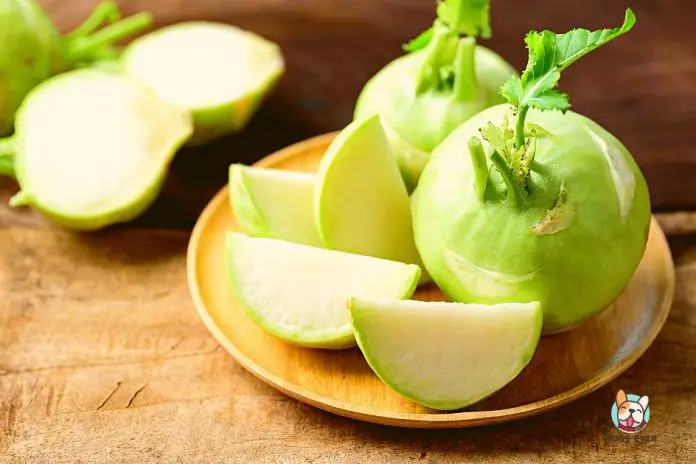If you’ve ever eaten kohlrabi, you know it is a member of the cruciferous family of vegetables. If you have a dog, you understand how difficult it is to stop yourself from giving your dog a sample of whatever you’re preparing. You might be wondering: can dogs eat kohlrabi?
Now, if you are unsure if you should give kohlrabi to your dog or not, then all of your questions will be answered here!
Can Dogs Eat Kohlrabi?
Yes, it is the solution. Kohlrabi is edible to dogs. A vegetable from the cabbage family high in fiber and vitamin C is called kohlrabi. You may eat it raw or cooked, and it has a sweet and tangy flavor.
Kohlrabi is a crunchy vegetable that dogs like to eat since it is an excellent source of nutrients for them. In addition to helping to maintain a healthy digestive system and reduce bowel incontinence problems, kohlrabi can also make your dog’s coat look better.
Kohlrabi is an excellent choice if you’re searching for a nutritious treat for your dog or making them happy.
But do remember that before feeding the veggie to your pet, be sure to wash it thoroughly.
How Is Kohlrabi Good For Dogs?
Vitamin C helps to strengthen your dog’s immune system, and the B family of vitamins has a variety of positive effects on your dog’s health. Kohlrabi is a good source of both. It also contains a lot of dietary fiber, which helps with digestion.
It’s crucial to remember that kohlrabi, like arugula and broccoli rabe, is goitrogenic, which means that excessive consumption in dogs can result in hypothyroidism. As a result, it’s best to give your dog kohlrabi sparingly.
Benefits of Giving Kohlrabi to your Dog
There are undoubtedly some advantages to giving kohlrabi to your dog. Here are a few of them:
Vitamins
There are a few vitamins that are naturally present in kohlrabi, including:
- Vitamin A has antioxidant qualities in addition to being recognized to aid with visual function.
- Your dog’s cells benefit from vitamin C’s anti-free radical properties. This vitamin also aids the immune system of your dog.
- The kohlrabi offers your dog some energy, and vitamin B aids in the production of red blood cells in your body.
Minerals
Like vitamins, several minerals are also present in kohlrabi in its natural state. Which are:
- Magnesium benefits your dog’s cells, as well as the way their muscles and general health function.
- Another beneficial element that supports the health of the body’s muscles is potassium.
- Calcium aids in the development of healthy teeth and bones. This is crucial, particularly if your dog is still developing.
Fewer calories
Kohlrabi has few calories if you give your dog a moderate amount to eat. If your dog already has an obesity issue, this is fantastic. A small serving of kohlrabi will be a delicious treat.
How Can I Safely Give Kohlrabi To My Dog?
Both cooked and raw kohlrabi are edible to dogs; however, prepared kohlrabi is simpler for them to digest. For your dog, you can boil, steam, or bake kohlrabi.
To prevent choking, chop the kohlrabi into bite-sized pieces. Some dogs will eat delightful treats like kohlrabi whole. Additionally, you should avoid using oils and seasonings since they may disturb your dog’s stomach.
Like turnips, kohlrabi develops leaves from the base of its bulbous body. The leaves should not hurt your dog if they eat them, but they have no recognized advantages and ought to be thrown away.
In large doses, kohlrabi can result in hypothyroidism. As a result, if your dog has thyroid problems, it should never be given.
Can Dogs Eat Kohlrabi Leaves?
Giving kohlrabi leaves food is a smart move. The leaves are much healthier since it has a greater nutritional concentration than the tuber.
If you enjoy eating kohlrabi, you may frequently have extra leaves and stems that are ideal for your dog. He has issues with the leaves’ raw digestion, therefore you should offer them to him cooked, finely diced, or pureed.
Kohlrabi Nutritional Value for Dogs
Kohlrabi is a very healthy vegetable, as was already established. Among other minerals, it is a great source of calcium, vitamin B6, folate, and phosphorus (as mentioned above). The table that shows how many calories (135 grams) there are in a cup of raw kohlrabi:
| Nutritions | Value |
| Calories | 36 |
| Carbs | 8 grams |
| Protein | 2 grams |
| fiber | 5 grams |
| Vitamin B6 | 12% of the Daily Value (DV) |
| Vitamin C | 93% DV |
| Potassium | 10% DV |
| Manganese | 8% DV |
When NOT to Give Kohlrabi to your Dog
Every action has a negative reaction. Even the best foods might have minor drawbacks when eaten in large numbers. You may find a few adverse effects listed below that you need to be aware of:
Allergic Responses
An allergic response might be triggered by anything. When your dog tries a new meal, you must be on the lookout for this.
Lethargy, vomiting, and itching skin are a few common symptoms of a food allergy. So, before giving your dog more of a new meal, start with a modest quantity and watch how it responds.
Digestive Issues
Kohlrabi might cause your dog’s digestive system to malfunction, resulting in diarrhea. This is due to the high amount of fiber present in this vegetable.
Additionally, the vegetable’s greens might be particularly difficult to stomach. To make it easy for your dog’s digestive tract, make sure you either chop it up extremely little or cook it completely.
Psoralens
Psoralens is a natural toxin that is present in several foods, as I said above. One of those foods is kohlrabi; to keep your dog safe, the peel or skin of this vegetable should be removed. Although this poison won’t kill your dog, it still might cause skin damage.
Frequently Asked Questions:
Which veggies are considered toxic for canines?
The onion family is highly poisonous to most dogs and can cause gastrointestinal discomfort, bowel Incontinence, and red blood cell destruction, whether it is raw, dried, or cooked. Illness symptoms from these toxic veggies may not always be apparent right away and may not show up for many days, so do make sure what your canines are eating.
Can puppies eat Kohlrabi?
Yes, young pups can eat kohlrabi, but only after it has been mashed into a purée. However, kohlrabi that is raw or undercooked is poisonous to them.
Can Kohlrabi cause allergy flare-ups in dogs?
One of the veggies that are very unobtrusive concerning allergies is kohlrabi. Nevertheless, it does happen that certain dogs with allergies cannot accept kohlrabi. Since cross-allergies are unknown in this situation, the impact of an allergy is typically less severe.
The histamine in kohlrabi is more likely to cause reactions in sensitive dogs and allergy sufferers. Usually, when the body has an allergic reaction, histamine is produced. Meals may exacerbate allergy responses since histamine is a biological byproduct of several substances that are often created as foods develop and deteriorate.
Dogs, on the other hand, have a severe histamine intolerance. They couldn’t eat carrion otherwise, which would be entirely out of the ordinary. This implies that kohlrabi does not necessarily cause problems for your dog if other allergy sufferers do not. Even if he has other allergies, it is more probable that kohlrabi will be tolerated well by him.
Conclusion
So, Can dogs eat kohlrabi? Yes, as long as you give it to your dog in moderation, they may eat this vegetable. Your dog could prefer the flavor or not. But it will provide your dog with some excellent vitamins and minerals that are good for their health.
It would be best if you gave your dog Kohlrabi sometimes, but only in moderation. Introduce it gradually, as you would with any new meal, and watch your dog’s reaction. Stop feeding them Kohlrabi if they experience any digestive problems, and then talk to your veterinarian.



